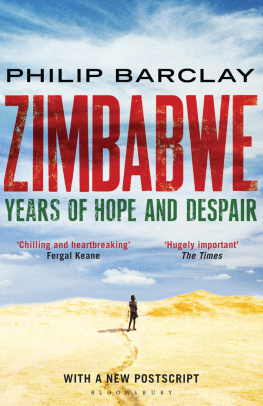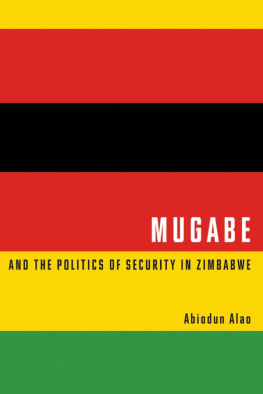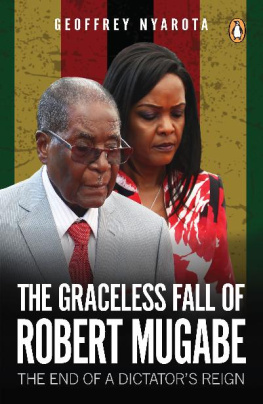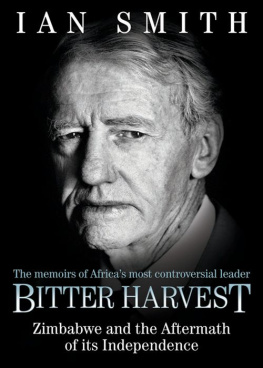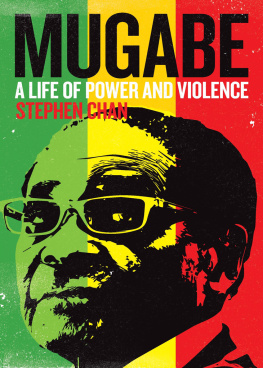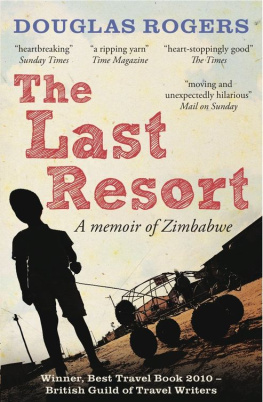It would have been impossible to write this book without support, advice and information generously given by hundreds of people during my time in Zimbabwe.
The British Embassy team housed, fed and tolerated me through times when all of those tasks seemed impossible. I am not supposed to name individual colleagues, but without the work of the entire Embassy staff, I would not have been able to live and work in Zimbabwe. I am particularly grateful to the management section, which, against all odds, consistently secured fuel and food; and to the members of my Community Partnership Programme team (you know who you are) for their work. I will break the no names rule for three people. I am grateful for the guidance of the Ambassador, Andrew Pocock, who encouraged me to write, suggested pithy one-liners for which I was happy to take authorial credit and reminded me when necessary, which was too often, to get back in my box. I will also name the UKs Defence Attach through the nightmare days of 2008, the late Lieutenant Colonel John Kane. John was the ideal of a modern British soldier decent and dynamic in pursuit of a progressive agenda. His savage humour and robust good sense helped me through many a bad day. I miss him.
I also want to thank by name my wife Emma, who served as the Embassys Human Rights Officer through four grim and bloody years when those rights were in short supply. It often seemed that whenever a detainee was on trial or a few committed demonstrators began their short march towards police truncheons, Emma would be there, recording and reporting, so at least somebody, somewhere knew that Zimbabweans were defying their cruel leaders. She was the oracle within the diplomatic community and willingly shared her reports of abuse with colleagues of all nations, even if they took the credit for them in their own capitals. I remember her spending many evenings repeatedly dialling the unreliable mobile phones of lawyers in remote areas, trying to find out whether individual prisoners had been released. She, like other colleagues, is not named in the book, but readers should be aware how much of its content derives from Emmas work.
The international community circled its wagons in Harare; certainly relations with other Embassies were much warmer than I have found elsewhere. I enjoyed the friendship and co-operation of aid workers and diplomats from many countries and from colleagues in other parts of the British set-up, particularly the DFID womens team (you too know who you are). My picture of goings-on in Zimbabwe would have been incomplete without the benefit of this network of information sharing and discussion.
I am particularly grateful to my agent, Anne-Marie Doulton, whose idea this book was. She used a fine combination of persuasion and bullying to extract the words from me and curbed my regrettable tendencies to florid prose and literary quotation.
The team at Bloomsbury Michael Fishwick, Anna Simpson and Alexa von Hirschberg have been wonderfully supportive and tolerated all the follies of a first-time writer. I am grateful to Bloomsbury also for finding in Peter James a knowledgeable and thorough copy editor who greatly improved my text.
Helmut K Watson and Mark W Adams (who both have dramatic middle names) have kindly allowed me to use their photos on the beautiful jacket around this book.
Without my familys support it would have been hard to keep going. Emma a wife as well as a fellow diplomat was more than a loving companion, an anchorage on stormy days or a source of strength though she was all of those things. She was muse and enabler combined she made this book happen. She urged me to write, made me believe that I could and then supported me emotionally and materially when I did so.
My mother Janet and father Leslie gave me the best upbringing I could wish for and have been a lifelong inspiration to get my act together and write. In the Zimbabwean style I define my family broadly; certainly within it fall my domestic staff in Zimbabwe, Philip and Savemore, whose labours saved mine, and the greatest of friends: Antonio, Carolyn, Dyane, Mark, Mark and Ruth.
I am grateful to the following for corrections to the original text of this book and for other helpful comments on the new edition: Claire Freeth, Leif-Erik Stabel, Judith Todd, Trevor Grundy, Clifford Chitupa, Mashiri. Her Excellency Trudy Stevenson, Mark and Ruth Walkup and Derek Ingram.
Finally and most importantly, I must acknowledge the input I have received from the battered but unbowed members of Zimbabwes civil society. I have no idea how it is possible to operate as a human rights lawyer, to treat torture victims, to campaign for human rights or to work for the improvement of communities and public services, when such work carries the constant threat and frequent reality of abuse, beating, detention, torture, imprisonment and death. I will not name individuals, as doing so would place them at risk. In any case there are many thousands of people in Zimbabwe, trying to help their country discreetly in the type of areas where thugs carry out their attacks. I would not like to name any, if I cant name all of these courageous people who confront every day a fear that I found quite crippling.
Despite the pressures of their work, members of Zimbabwes civil society groups were unstinting in their help, work, friendship and supply of information. Without this generosity this book would have been impossible to write.
Friends in civil society often say that the fears and horrors they face are more bearable knowing that somebody overseas cares about their struggles for a better country. It was a great privilege to be posted in Zimbabwe so that I could demonstrate that the world did care and a greater privilege still to record my friends continuing struggles in this book.
Philip Barclay is a British diplomat who lived and worked in Zimbabwe between 2006 and 2009. He has written several articles about Zimbabwe for the Sunday Times and the Guardian Online . Zimbabwe is Philip Barclays first book. He lives in London and Ankara, Turkey.
I felt a passion for Zimbabwe from the moment I arrived at the British Embassy in Harare in January 2006. I had read everything I could about the country. According to some of the livelier newspaper stories, I was going into a war zone something like the Congo or Sierra Leone. I was braced for violence, the chaos of hyperinflation and food shortages.
What I found was a temperate paradise of green hills and waterfalls, orderly and organised, filled with happy people. The rainy fertility of January made the grass grow a metre high. I saw some empty fields, but others filled with sunflower-like plants I soon learned were maize. The roads were smooth and wide, despite the warnings of expat Zimbabwean friends that they would be cratered with deep potholes.
I was ready to see homeless people and piles of rubble the remnants of Mugabes notorious Operation Murambatsvina in 2005. But on the road from the airport into town I saw blocks of good-looking brick-built houses, each standing in its own garden, supplied with electricity and water. I asked the Embassy driver if the ruling ZANU-PF people lived in these good-looking houses. He laughed: These are for the ordinary people. It was early afternoon and the number of children walking home from school astonished me. They were smartly dressed, clean and well behaved. It was immediately obvious that most children, even from Harares poorer areas, went to school.
I could not believe it. Where was the blood on the streets? I stayed for my first few nights in the colonial-style comfort of the Meikles Hotel right in the centre of town. I was tense, ready for shooting to break out, but there was none. One morning at six oclock I heard the stirring sound of dozens of male voices from the streets. They were singing a marching song. Was it the war veterans come to murder white tourists in their hotel beds? No, it was a squad of trainee policemen jogging through the streets, vigorous and ebullient, but rather comic in their green vests and shorts.
Next page
